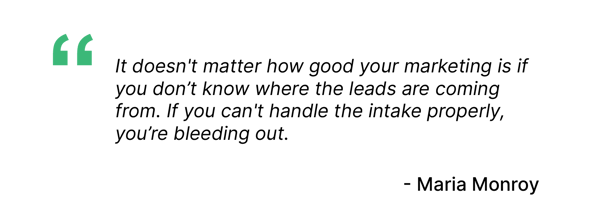In CASEpeer’s most recent ‘Conversation With’ webinar, “Setting Your Firm’s Marketing Strategy up for Success in 2022,” our CEO and Co-Founder, Gabriela Cubeiro, sat down with Maria Monroy, President and Co-Founder of LawRank. The two discuss key components for a successful marketing strategy that every law firm should be harnessing, “Google My Business” and why it is so crucial in generating leads, why reviews are so important and which review platforms are industry best, and much more.
Having a successful marketing strategy is dependent on having a strong foundation in other areas of your firm. Maria stresses the importance of knowing where leads are coming from so that you can make better educated marketing decisions.

The fundamental areas of your firm, like intake, must be strong otherwise you are leaving cases on the table. Maria advises listeners to work on the fundamentals of their firm first and then to focus on the marketing. With CASEpeer, you can streamline your intake process with our suite of intake management features. Know where your leads are coming from and track client intake right as it comes in. Aside from tracking intake management, there are several other metrics that firms should be tracking.
There are three non-negotiable metrics that firm owners should be comparing to their top ranked competitors. Maria goes into tracking your referring domains (where your backlinks are coming from), the number of pages indexed, and your website’s monthly organic traffic. Maria knows Google's best practices through and through. She parts her wisdom on how firm owners can get their firm's website to rank higher on a Google search.

When choosing which keywords to target on a Google search, Maria suggests thinking in terms of what a Google user would be typing into the search engine when looking for the services your firm offers. She encourages law firms to veer away from choosing commercialized keywords and instead focus on keywords that answer the questions their particular prospects may actually be entering into Google when searching for their firm. Maria uses a software called SEMrush to track website traffic and help her determine marketing strategies. She describes this software as an industry standard that all firms should be using.
Maria breaks down the difference between local SEO and organic SEO. These are two completely different algorithms that run at the same time. There is a need to rank in both local and organic searches for your law firm. She emphasizes that Google cares about the user experience and goes into the importance of a firm’s Google My Business listing. A strong Google My Business listing is crucial to ranking for local SEO. Maria explains that the goal is to rank within the top three search results within a mile of your business’s physical location. An up-to-date and well-developed Google My Business listing can convert leads into clients very quickly as well as increase your return on investment. Reviews are another important aspect of a firm’s Google My Business listing.

In terms of a golden standard for the number of reviews a firm should have, Maria suggests comparing yourself to competitors in your industry. Google My Business listings are the most important place for a firm to receive reviews in Maria’s opinion. Maria encourages listeners to not be afraid of a negative review. If you have only positive reviews, prospective customers may think that the reviews are fake. She prompts listeners to embrace negative reviews and answer them, along with the good reviews. People want to see how a business treated the customer who left a negative review. When responding to a review, you are not only responding to the client who left the review, but to everyone who may read the review. In addition to reviews, website design is a marketing factor that can help you convert leads into clients.

The quantity of people going to your website does not matter unless those people are converted into clients. If you're not converting them, there may be an issue with your website. It is important for a website to quickly and easily display what you do, where you do it, and why a customer should hire you. A website should be clean, professional, and to the point. Especially with personal injury law, you need a contact submission form higher up on a website page. Maria emphasizes the importance of making it easy for a client to contact you. For that matter, CASEpeer offers a streamlined intake window to gather new clients’ critical information, and CASEpeer's reporting features give you transparency into referrals and lead sources. Aside from making yourself reachable to prospects and tracking conversions, she recommends leading with a picture of yourself on your firm’s website. People visiting your website want to see human faces and authenticity. Maria shares that leading your website with an image of yourself is crucial for converting leads and conveying authenticity.
In conclusion, good marketing starts with having strong fundamentals in other areas of your firm. Throughout Maria’s and Gabriela’s discussion, the two touch on several key topics around increasing website traffic, managing reviews, and following Google’s best practices to further your marketing efforts. Watch the full webinar for more valuable insights from this conversation with Gabriela Cubeiro and Maria Monroy.